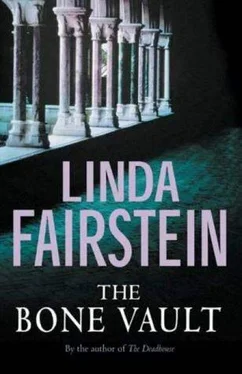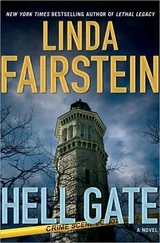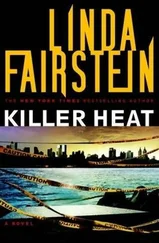“The detective and I would like to begin with you this afternoon, Mr. Lissen. If there’s a telephone I can use first, I’ll notify my boss that we’ve identified the deceased.”
“Of course, Miss Cooper. Please use the one on my desk. I’ll step out to Miss Drexler’s phone and call the gentleman who’s in charge of the Cloisters. He can pull up Miss Grooten’s file.”
I dialed Paul Battaglia’s direct line and hoped Rose Malone would answer. She sounded busy-or distant-and tried to patch me through to the district attorney before getting back on the line to tell me that he wouldn’t pick up my call. That hadn’t happened to me very often.
“Just tell him we think we got an ID. The deceased is Katrina Grooten, and she was working up at the Cloisters, on a special joint project that involved a few of the museums. ME thinks the cause of death is poisoning. Soon as I know any more you’ll have it.”
I handed the receiver to Chapman and moved out of his way. “Hey, loo. Got a tentative make on Saint Cleo. Some kind of art maven working in one of the museums. From South Africa, here on a visa. Coop and I’ll pop up to the Cloisters tomorrow, when we’re done in this joint, see if anyone knows why or when she quit her job.”
He put the phone down and picked up a photograph from Thibodaux’s desk. The handsome woman in the eight-by-ten frame was smiling back at him, dressed to the nines and standing in front of the glass pyramid in the courtyard at the Louvre.
“Mrs. T.?”
Eve Drexler nodded.
“She have anything to do with the museum, officially?”
“No, Mr. Chapman. She’s dead. Killed in a ski accident at Chamonix, winter before last. They had only been here at the Met for little more than a year. I was right here in the office with Pierre when he got-”
Drexler stopped talking when Thibodaux opened the door and reentered the room. “Hiram Bellinger, the director of the Cloisters, will see you anytime tomorrow that suits you. He didn’t know Miss Grooten well, but he’ll pull her file and be prepared to give you whatever you need.”
Chapman turned his back to the director and whispered to me, “Let’s get a gander at the setup here this afternoon, meet at the morgue in the morning to see what Kestenbaum has for us, then spend as much time as we need uptown, talking to the people she worked with.”
“Fine with me.”
He walked back to the conference table to pick up his steno pad. “Tell Bellinger we’ll be there about twelve tomorrow. Hasn’t he got anything he can fax over to you now?”
“The basic personnel records should be in the database, even if the entire file is archived. I expect he’ll have her address and date of birth over to me shortly. What else would you like?”
“Next of kin would be nice. I’d hate for them to find out about this on CNN. Maybe she has family here who can help us out.”
“How thoughtless of me. Why don’t you start downstairs with Maury, and Miss Drexler will find you as soon as the information comes in.”
“Did he say there was anything strange about Ms. Grooten’s disappearance?”
“Nothing at all, Detective. He said he remembered that there was a letter of resignation from late last December that he put in the file. You two should be able to track this down better than we can: Bellinger said that Katrina had been planning to leave the city for some time, ever since she’d been assaulted-how do you say, violated?-in that park up at the Cloisters after leaving the museum late one night. She’d never been quite the same after that.”
Thibodaux closed the door of his office and left us at his secretary’s desk with Ms. Drexler, who was waiting to escort us to the basement.
“Could you give us some privacy while we make this call?” Chapman asked. Both women stepped into the hallway.
I watched him dial the number of the Special Victims Squad as he looked at his watch.
“Hey, Joey, Mercer Wallace working today?” He paused while the detective who had answered looked at the duty chart. “When he gets in, tell him to give me a call on my cell. I need him to check an old case. No thanks, no need to bother you with it.”
He hung up the phone. “Must be losing your touch, blondie. How is it you wouldn’t know about a legit complainant attacked in a public park?”
“‘Cause somebody tanked the case. Didn’t want to let us take a crack at it.”
“That means there’s a boss up there who doesn’t like you, or even the guy who took the squeal. You sure it doesn’t ring any bells?”
“I’ll have Laura check the screening sheets, but it’s got too many hot-button items not to stand out in my memory.” We had a detailed system of tracking sexual assault cases in the unit, in which every incident was cross-referenced by the name of the victim and the offender, the date and place of occurrence. Reports were made in each circumstance, whether or not an arrest was effected or the case went to trial. Sarah and I liked to think our record-keeping was foolproof, although the police department managed to keep things under wraps from time to time.
“You got a victim who’s a foreigner-which would make the mayor ballistic.” It was bad enough to assault or murder a New Yorker when City Hall was tracking crime stats so closely, but attacks on out-of-towners led to national headlines that threatened the income tourists fed to the hotel and restaurant industries. “She worked for a major art institution, attacked in a public park. Likely to cause a stir. Mercer’s coming in any minute on a four to twelve. He can dig around for the case folder.”
Mercer Wallace was the third man in what we liked to think of as our team. At forty-one, he was five years older than Mike and me, and about to become a father for the first time. He had remarried his ex-wife, Vickee, on New Year’s Day, after she reappeared in his life to help him through the aftermath of an investigation in which he had suffered a near-fatal gunshot wound to his chest.
Mercer’s great height and dark black skin made him a physical standout in any room. But it was his meticulous investigative style and compassionate manner with witnesses that won him the coveted spot as my favorite detective at the Special Victims Squad, which was responsible for handling every sexual assault and child abuse case in the borough. The son of a widowed airline mechanic who had worked several jobs to save for Mercer’s college education, he had at the last minute turned down a football scholarship to the University of Michigan to enroll in the Police Academy.
Mike and Mercer had worked together at Manhattan North Homicide for several years, until Mercer decided that he preferred to deal with witnesses who were still alive and needed the strength of a sensitive, smart detective to help restore their dignity and find some kind of justice for their assailant. More often than we liked, the work of the two units overlapped, and the victim of some kind of sexual violence became the subject of a murder investigation.
Eve Drexler was waiting for us in the hallway. She led us back to the elevator and pressed the button for the basement level. When the doors opened, she pointed to the sign across the corridor that had Lissen’s name printed on it. They closed before I remembered to ask her to finish her sentence about what had happened when Thibodaux received the call about his wife’s accidental death. I told Mike to add it to his list of questions.
The cubicle that was home to the shipping department head lacked the lavish accoutrements of the museum director’s office. Unframed reproduction posters were thumbtacked to the scratched walls, much as in a college dorm room. File cabinets ringed the perimeter, the dust on the computer looked so thick that it appeared to have been untouched since it was installed, and the desk was crowned by sloppy piles of yellow and white papers.
Читать дальше












